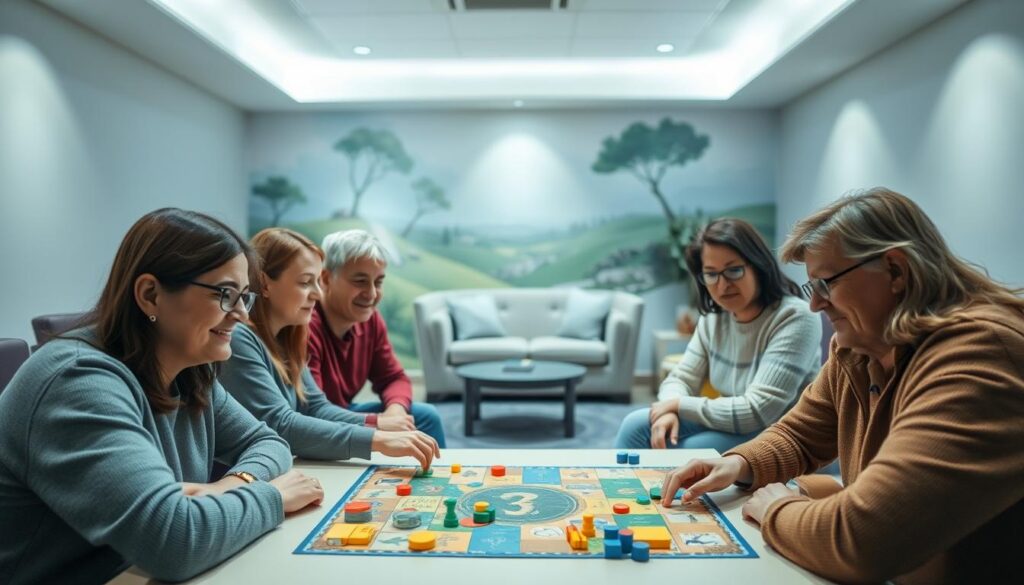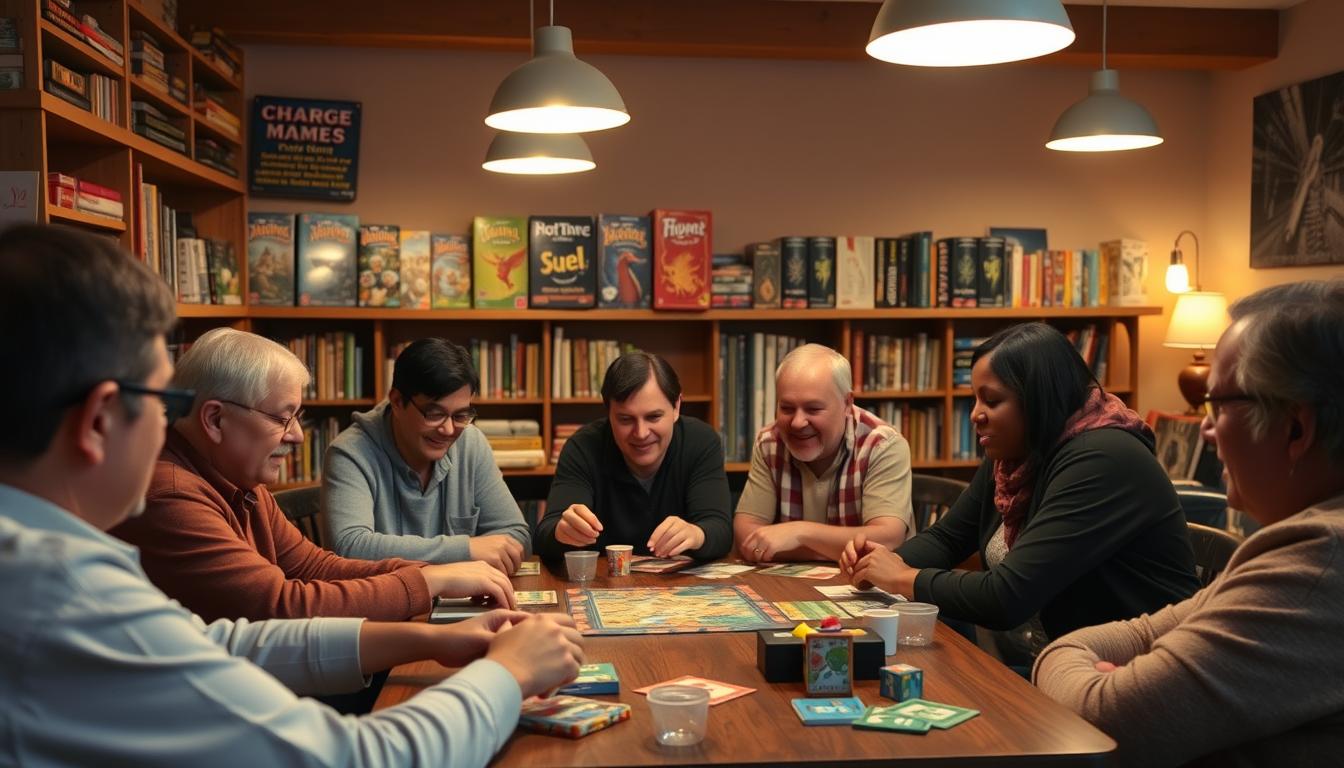Educational games used in support groups for emotionally challenged adults
Have you ever thought about how play can help adults heal emotionally? Therapy is changing, and games for adults are becoming key in support groups. These games help people manage their feelings and build connections. They create a safe place for growth and understanding among those facing challenges.
We will look into how these games help. They can build resilience, improve social skills, and deepen emotional understanding. This is all within the supportive environment of a group.
The Importance of Emotional Regulation in Adults
Emotional regulation is key for adult mental health. It helps manage feelings, thoughts, and actions. This skill boosts well-being and strengthens relationships, making us more resilient.
When we can’t regulate our emotions, we might face anxiety or depression. It’s crucial to have strategies to handle stress and tough feelings. Adults who learn to regulate their emotions use special thinking techniques to stay calm.
Learning to manage emotions helps us cope better and support others. It gives us a way to deal with life’s challenges. By understanding these skills, adults can handle life’s ups and downs more easily.
Understanding Emotionally Challenged Adults
Adults with emotional challenges face complex issues. Mental health problems like anxiety, PTSD, and depression make it hard to connect with others. They struggle to manage their feelings well.
These challenges often come from past traumas or ongoing stress. This makes it tough for them to be emotionally aware.
Learning to understand their emotions is key. It helps them manage their feelings better. This leads to healthier relationships and a better life.
It’s important for them to use coping strategies every day. Mindfulness, journaling, and social activities can help. These methods improve emotional stability and self-awareness.
Benefits of Using Educational Games in Support Groups
Educational games bring big benefits to support groups, especially for those facing emotional challenges. They create a safe space where people can share their feelings and thoughts. This helps in growing emotionally and learning to communicate better.
Playing games together helps people understand and connect with each other. It builds trust and lets everyone share their stories. Games also boost critical thinking and problem-solving skills, helping to tackle life’s problems.
Games are more than just fun; they help people grow. They teach coping strategies and improve resilience. This strengthens the group’s bond, making everyone feel supported and improving emotional health.
Educational Games for Adults in Support Groups
Using educational games in support groups helps adults grow emotionally. These games can improve skills like emotional awareness and communication. We’ll look at different games and how to use them effectively in these settings.
Types of Games That Foster Emotional Growth
There are many games designed to boost emotional intelligence in adults. Here are a few:
- Emotional Charades: Players act out emotions for others to guess, helping them recognize feelings better.
- Role-Playing Scenarios: Players act out hypothetical situations. This builds empathy and lets them share feelings.
- Team-Building Activities: Games that need teamwork improve trust and communication among group members.
Implementation of Games in Group Settings
It’s important to use games well in support groups. Start with simple games to help everyone feel comfortable. Then, add more complex ones that make people think deeply.
Make sure to explain the games clearly and create a safe space for everyone. After each game, have a discussion to help everyone understand what they learned. This helps them think about their feelings and experiences.
Building Self-Awareness Through Games
Self-awareness is key for emotional growth, especially in support groups. Emotional games help people identify and share their feelings. They learn to spot their emotional triggers and how they react in a safe space.
Adding reflection activities to emotional games makes the journey even better. For example, talking about the game afterwards helps people understand their feelings better. Writing in a journal can also help, letting them process their thoughts and emotions.
Games help build emotional intelligence by making feelings clearer. This boosts confidence and helps people interact better with others. Games focused on self-awareness lead to healthier relationships and a supportive community where everyone can explore their emotions.
Enhancing Coping Skills with Educational Games
Educational games are great for teaching coping skills, especially for managing stress. They offer fun ways to learn how to deal with tough emotions. Players get to try out different strategies in a fun, interactive way.
Strategies for Managing Stress and Anxiety
Playful activities can help manage stress and anxiety. Some strategies include:
- Role-playing different coping strategies to enhance emotional resilience.
- Engaging in deep-breathing exercises that reduce tension.
- Utilizing positive self-talk techniques to challenge negative thinking.
These activities help adults understand their feelings better. They learn how to handle anxiety and stress every day.
Promoting Mindfulness in Play
Mindfulness games help people stay in the moment. This makes it easier to manage stress. Games might include:
- Mindful observation activities, encouraging focus on sensory experiences.
- Mindfulness meditation integrated within gameplay.
- Interactive scenarios aimed at fostering a calm, centered mindset.
These games help players explore their emotions. They improve mental health by creating a calm, centered environment.

Strengthening Connections: Social Interaction and Trust
Games that boost social interaction are key in building trust in support groups. They help create a space where people can work together and talk openly. This makes it easier to form strong bonds.
When people play team games, they start to share their stories and feelings. This can lead to deeper connections between them.
Working together on challenges helps group members feel closer. They celebrate their wins and support each other through tough times. This builds trust and makes everyone feel safe to open up.
These support groups become a network of care and understanding. Games help members create a safe space to support each other. They grow together, emotionally supporting one another.
Games That Teach Problem-Solving Abilities
Problem-solving skills are key for dealing with life’s daily challenges, especially for emotionally challenged adults. Playing educational games that involve strategy and critical thinking helps. These games offer a safe space to practice solving problems together.
By facing real-life challenges in games, players learn to analyze and think from different angles. This boosts their creativity in solving problems and builds confidence in dealing with tough emotional situations. The skills gained from playing games improve decision-making and emotional strength in everyday life.
| Type of Game | Focus Area | Skills Developed |
|---|---|---|
| Escape Room Games | Real-life challenges | Critical thinking, teamwork |
| Puzzle-based Games | Strategic thinking | Problem-solving, logic |
| Role-playing Games | Scenario exploration | Empathy, perspective-taking |
| Board Strategy Games | Problem-solving strategies | Analytical thinking, planning |
These educational games help players tackle challenges well. They strengthen problem-solving skills and improve critical thinking in real life.
Developing Empathy and Communication Skills
Educational games are great for teaching empathy and communication skills to adults. They make people try on different roles, helping them see things from others’ viewpoints. This way, they get to understand emotions better and connect with others more deeply.
Good communication is key for getting along with others. Through these games, adults can practice sharing their thoughts and feelings. This helps groups solve problems and build stronger, healthier bonds.
Playing these games also brings people together, creating a community where empathy grows. As they learn to listen and show compassion, they form stronger connections. This makes support groups a more welcoming place for everyone.
Utilizing Creative Games to Foster Creativity
Creative games are key in support groups for emotional expression and communication. They use art and storytelling to spark creativity and self-discovery. These activities help people share their stories and feelings more easily.
Art-Based Activities
Art-based activities boost creativity. People express their feelings through painting, drawing, or crafting. It makes them feel accomplished and helps them share their emotions visually.
Art in a group setting is safe and enhances emotional well-being. It lets people explore their feelings in a supportive environment.
Storytelling Games for Enhanced Communication
Storytelling games improve communication and creativity. They let people share their stories or make up new ones. This way, they express their thoughts and feelings better.
These games also improve listening skills and build connections. They create a supportive atmosphere. Educational games based on storytelling help people understand themselves and others better.
Movement and Mindfulness Games
Movement games are a great way to mix physical activities with emotional control. They help people move their bodies, which boosts fitness and lowers stress. This physical activity helps release feelings that feel too much.
Mindfulness is key in these games. It helps people connect with their feelings while moving. This practice makes them more aware of their emotions and calmer. It’s a space where learning to control emotions is encouraged.
Together, movement and mindfulness improve how people feel. Doing these games often helps people relax and stay healthy. They are especially helpful for managing strong emotions.
Assessing the Effectiveness of Educational Games
It’s crucial to check how well educational games work in support groups. We use different ways to see if these games help with emotional growth. This helps leaders know if the games are really making a difference.
Before and after playing, we ask people how they feel. This tells us if the games are helping. We also listen to what players say to learn more about their experiences. Watching how the group changes helps us see if the games are creating a supportive space.
Using outcome measures helps us check and improve the games. By always looking at how the games affect people, leaders can make them better. This ensures the games stay useful and meaningful for everyone involved.
| Assessment Metric | Description | Purpose |
|---|---|---|
| Emotional Awareness Surveys | Questionnaires measuring emotional insights pre- and post-game | Evaluate individual growth in emotional understanding |
| Participant Feedback | Gathering experiences and suggestions from users | Improve game effectiveness and engagement |
| Group Dynamics Observation | Monitoring interactions and behaviors during sessions | Assess overall emotional support and relationship building |
Keeping up with assessments helps make the games better over time. This boosts the success of emotional growth efforts in these educational games.

Best Practices for Facilitating Group Games
Leading group games in support groups needs a grasp of good facilitation methods. It’s key to make everyone feel included. This way, all members can join in.
Good facilitators set rules that everyone can follow. They make sure everyone knows what’s going on. This helps everyone play together smoothly.
Being flexible is also important. Games should match the group’s mood and needs. This makes the games more effective in helping everyone grow emotionally.
Creating a safe space is crucial. People should feel okay to share and try new things. Positive feedback and encouragement help everyone learn more and bond together.
Adapting Games for Diverse Emotional Needs
It’s key to make games fit for everyone in support groups for adults with emotional challenges. This makes group activities more inclusive and effective. Games are adjusted so everyone can play, no matter their skill level.
For those who need different ways to join in, offering various activities helps. This way, everyone finds a place where they feel comfortable.
Personalized support is very important. Knowing how each person feels helps leaders plan better activities. This makes people more likely to get involved and grow emotionally.
Choosing the right games is crucial. Leaders use what they know about each person to make everyone feel important. This way, groups become places where healing and growth happen.
| Game Type | Adaptation Strategies | Target Emotional Need |
|---|---|---|
| Board Games | Modify rules for simplicity | Reduce anxiety, foster participation |
| Role-Playing | Offer script guidelines | Enhance communication skills |
| Creative Arts | Provide different mediums | Support self-expression |
| Movement Games | Adjust physical demands | Promote mindfulness and relaxation |
Conclusion
Educational games in support groups for emotionally challenged adults are a game-changer. They help people grow emotionally and become more resilient. These games make learning fun and help people connect with each other.
By using these games, support groups become more than just meetings. They become places where people learn and grow together. This makes the group more effective in helping its members.
Adding educational games to group therapy changes the game. It turns boring sessions into fun, interactive learning experiences. This helps build a sense of community and supports emotional health.
In the end, using educational games in support groups is a win-win. It makes the emotional journey of participants richer. It helps them develop emotional resilience and build strong relationships.
FAQ
How can educational games help emotionally challenged adults?
Educational games help by improving emotional awareness and building social connections. They also enhance coping skills in a safe space. This leads to better relationships and resilience.
What types of educational games are effective for support groups?
Good games include emotional charades, role-playing, team-building, and problem-solving. These activities boost emotional recognition, empathy, and communication skills.
How can facilitators implement educational games in support group settings?
Start with warm-up activities to build rapport. Then, introduce more complex games that require deeper emotional engagement. A supportive environment is key for success.
What role does emotional regulation play in these games?
Emotional regulation is vital for managing feelings and behaviors. Games help practice emotional modulation and coping strategies. This improves well-being and relationships.
How can educators assess the effectiveness of the games used?
Use pre- and post-game surveys, participant feedback, and observe group dynamics. This helps refine approaches and increase emotional development impact.
Can educational games help build self-awareness among emotionally challenged adults?
Yes, games designed for self-awareness help identify emotions and triggers. Activities like guided reflections and journaling deepen self-exploration.
What strategies can be used to promote mindfulness through educational games?
Use games that focus on present-moment awareness, like breathing exercises. These practices reduce anxiety and enhance focus on positive experiences.
How do educational games encourage trust and social interaction in support groups?
Games that promote cooperation and shared experiences build trust. Team challenges foster collaboration, creating a supportive environment for emotional expression.
What type of games foster empathy and communication skills?
Role-playing and empathy-building exercises help understand others’ perspectives. These games are key for resolving conflicts and maintaining healthy relationships.
How can creative games contribute to emotional expression?
Creative games, like art and storytelling, provide outlets for self-expression. They help articulate emotions clearly, promoting therapeutic engagement.
What benefits do movement and mindfulness games provide in emotional regulation?
Movement and mindfulness games combine physical activity with emotional regulation. They relieve tension and promote relaxation, helping manage overwhelming feelings.
How can educational games be adapted for diverse emotional needs?
Adapt games by adjusting complexity and providing alternative activities. Personalizing ensures meaningful engagement for all participants.














